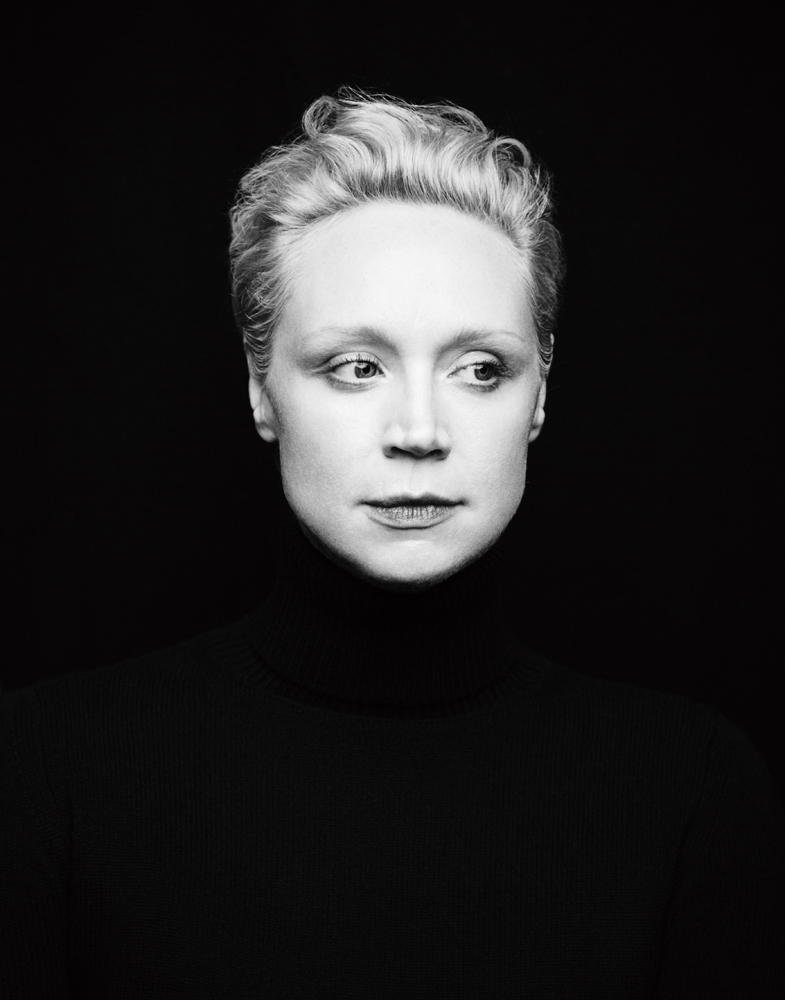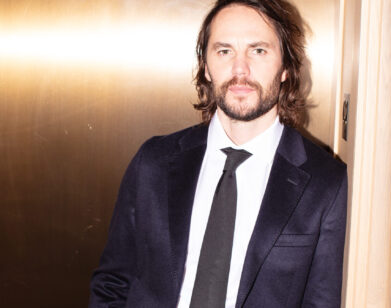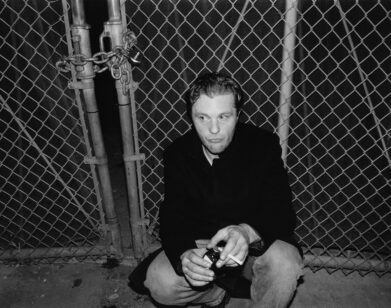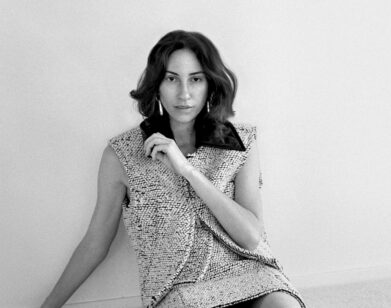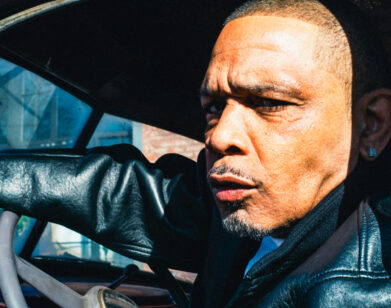Gwendoline Christie Awakens
GWENDOLINE CHRISTIE IN LONDON, NOVEMBER 2015. PHOTOS: MATT HOLYOAK/KAYTE ELLIS AGENCY. STYLING: NATALIE BREWSTER. HAIR: LARRY KING/STREETERS LONDON. MAKEUP: EMMA KOTCH/STREETERS. RETOUCHING BY SHOEMAKERS ELVES LONDON.
On Game of Thrones, Gwendoline Christie plays Lady Brienne of Tarth, an honest, loyal, compassionate, shit-kicking, badass hero. Introduced in the show’s second season, Brienne is a noblewoman who has always been mocked and marginalized for her stature. She finally finds acceptance amongst the followers of Renly Barathean (or at least Renly himself), one of three hopeful kings in Westeros. He welcomes her into his king’s guard, an honor exclusive to males, as a proper knight. Then he is murdered by a whispy black shadow bearing the face of his brother and it all goes to hell.
Although the show can get pretty brutal (it’s not afraid to kill off major characters and there are some pretty horrific rape scenes), Brienne brings out the humanity in other characters. One of the most interesting relationships on the show was between Brienne and Jaime Lannister, a man known throughout Westeros for killing a king and sleeping with his twin sister.
But Christie is more than just the character that made her famous. Over the last three years, the 35-year-old Sussex, England native has become something of a fashion icon: she’s modeled in shows for Vivienne Westwood and Iris Van Herpen, and is frequently pictured in the creations of London designer Giles Deacon. Next week she will be propelled into the world of super-fans through her role as Captain Phasma in Star Wars. It is only Christie’s fourth feature film after Terry Gilliam‘s The Imaginarium of Doctor Parnassus and The Zero Theorem, and last month’s The Hunger Games: Mockingjay—Part 2.
Here, Christie talks to her friend Samuel L. Jackson, who has appeared in a few Star Wars films himself.
SAMUEL L. JACKSON: Where are you?
GWENDOLINE CHRISTIE: I’m in Belfast, filming a new series of Game of Thrones. My plane was delayed for two hours and then I had a self-tape to do that needed to be in two days ago. [laughs] It’s been action-packed. Where are you Sam, where are you?
JACKSON: I’m in L.A. for now, but I’m on my way to an airport in half an hour to get back to Hawaii to go back to filming King Kong.
CHRISTIE: Oh wow! What’s Hawaii like?
JACKSON: It’s hot and beautiful. It’s the opposite of where you are.
CHRISTIE: [laughs] Basically, yeah. But Belfast has it’s own special charms, which I like.
JACKSON: I know. I want to be there. I think I’m coming there at some point to do The Blob next year.
CHRISTIE: You need to get in touch with the set production and do a set visit. I’m serious about this. I’m willing to fly in and give you that tour. What about July?
JACKSON: July might be possible because I may still be in Europe. I’m supposed to start another movie that shoots in London and Denmark and Sofia.
CHRISTIE: Sam, you don’t stop. What is the secret of your non-stopness?
JACKSON: I just love doing what I do, so I got to get out and do it. It’s interesting because we were filming one of those actor’s roundtable things for Variety or somebody, and Will Smith was talking about how he just decided he didn’t want to act for four years. How do you make that decision?
CHRISTIE: How did he make that decision?
JACKSON: He said he felt like he had done everything, he had peaked as an actor, there weren’t anymore challenges for him, he had accomplished everything. I was like, “really?”
CHRISTIE: So he just wanted to get back to being him?
JACKSON: And to connect to the world in another way.
CHRISTIE: I can understand that, but I don’t ever want to stop working.
JACKSON: I can’t get to not getting up and creating…which will lead me to my first question: When did you decide you wanted to be this thing that you are? I read you wanted to be a fashion designer? Or you just wanted to be in the fashion world?
CHRISTIE: I never wanted to be a fashion designer, although there is a book somewhere of fashion design I did for a collection when I was seven years old. I always wanted to be an actor. I did dance; I started doing ballet at the age of five and I loved it. When I got a little bit older, maybe seven, I started doing gymnastics. I did rhythmic gymnastics and I absolutely adored it. I was in the squad for Sussex. I wasn’t stupendous, but it was something that I was good at and I really loved the combination of discipline and expression. That, to me, was just dreamy.
JACKSON: The aspect of being somebody else?
CHRISTIE: Totally. The freedom to be someone else entirely and be different versions of something. That’s what I loved and I loved watching movies and I loved watching television, I loved reading books. That kind of escapism into another world was my favorite thing.
JACKSON: Where were you?
CHRISTIE: I grew up in Sussex, in the countryside kind of in the middle of nowhere, and this is in the days pre-internet. Although, I know people struggle to think that there was such a world, but Sam, you and I remember it, when it was tough to get information. I relied on—because I watched television avidly from about six or seven and watched movies avidly—what came my way. I remember reading about Lee Strasberg and watching Marlon Brando in On the Waterfront and watching Marilyn Monroe in Bust Stop and being really arrested by those performances.
JACKSON: Why did you go to Drama Centre as opposed to RADA or some other place? How did you make that decision?
CHRISTIE: I saw it on television. I remember watching a documentary of Drama Centre, I think I was 12, and it was the most hardcore, demanding, challenging place. The things they would ask of you were so psychologically rigorous, academically rigorous, physically rigorous. It just seemed like the most difficult and challenging training you could possibly have where people are really driven to their limits.
JACKSON: How was your time there?
CHRISTIE: It was tough; it was really tough. They told me I would find it difficult to find work because of the way that I look and they weren’t wrong. [laughs] I thought, “Well, I’ll prove you wrong” because I genuinely believed that the world was a more diverse place than they perhaps viewed it to be.
JACKSON: How did you feel about that when you finally finished that process and you got to the world? When you looked at the—I don’t like to call it competition, but when you went to an audition who was there? Smaller, more petite?
CHRISTIE: [laughs] No one like me.
JACKSON: Exactly.
CHRISTIE: And they were all getting the jobs. [laughs]
JACKSON: How long was it before you got your first job?
CHRISTIE: I was really, really lucky because I have always worked. It hasn’t always been consistent, but I have always worked. I think it was my first audition that I went to ever, but I didn’t hear anything back for two months. It was a job at the Royal Shakespeare Company with Declan Donnellan to do an ensemble production of Great Expectations in Stratford-upon-Avon, and it was to be a member of the ensemble of that. I got that, but I didn’t hear anything for eight weeks so I thought that I probably hadn’t gotten that and in the meantime went up for all sorts of television auditions. I was told that that I was too tall. If a part came along where the character was tall, they’d maybe consider me to play that part, but otherwise there was nothing for me. I heard that a lot and I just sort of thought, like I did before, the world was an even more interesting place than the people who were making the decisions were perhaps interpreting it to be.
JACKSON: So is that when you got back to the place where you thought, “Maybe I need to do something else?”
CHRISTIE: I had long spells of unemployment. Before Game of Thrones, I only did theater work really. I had done lots of theater and I really wanted to do screen work. I said to my agent, “Look, I really want to do screen work and I want to concentrate on that now” and he said, “Well, it’s going to be tough for you.” Ten months went by without anything, with no auditions, nothing at all. Friends were saying to me, “Do you think you want to consider something else?” [But] that was never, never an option for me. I was almost aghast that they could think such a thing.I don’t know if you ever felt this way Sam because I think you always, always work.
JACKSON: Once you settle and you start doing something else to augment what you want to do, you end up doing that settle thing. So that was never an option for me. I built sets, I hung lights, I did all kinds of stuff to stay in a theatrical situation so when my audition time came, nobody was asking me, “Well, who’s going to wait my tables?” I never did any of that. I was always in the theater—I might have been backstage or up in the rafters somewhere, but I was there. Somebody would say, “Good luck,” not “When are you going to be back?”
CHRISTIE: Yeah, exactly.
JACKSON: Simon Callow, that’s your mentor? Why him?
CHRISTIE: It all came from when I was at drama school. We had to do a production week for the third years, so the end of each term the first years had to do something. I built stages and I did stage management—I think I built the sets twice, I happened to be good with a drill, which is a talent I didn’t know I had. But I got to do box office in first term, which meant doing the box office with the school secretary, who is a very educated, brilliant woman with a brilliant mind and she also had been an actress. I wanted to impress because I felt I had very little to offer. I lied and I said I loved filing and we had a whole conversation about that. About a month later she rang me—Simon Callow went to Drama Centre London—and she said “Simon Callow needs someone to file his 4,000 compact discs and I thought you’d be the perfect person to do that.” As it turned out, we lived around the corner from each other. So I organized his 4,000 compact discs—mainly classical, very esoteric. I’d always loved his work, loved his books, and I completely and utterly fell in love with him. I did a good job on the filing. He had two boxer dogs, and I grew up with a boxer dog, so I started being a dog walker as well. He got me to compile his autobiography. I just became kind of a fixture for the next eight years and he mentored me. He’d come and see me in absolutely everything I was in. He would give me very, very honest feedback and he would throw books at me and scream at me about my lazy and disorganized mind. He was a great inspiration and told me to be an artist and to never, ever, ever give up. I was hugely lucky because I admired him so greatly to have someone in my life who was successful, who had real integrity, who was telling me to be myself. He was one of the first actors to be open about his sexuality from the second his career started and he inspired me and taught me to be bold about who I am and not to apologize for myself. Through all those spells of ups and downs, to have someone of that caliber to be there, to say, “I believe in you,” that’s very rare.
JACKSON: And what’s Terry Gilliam’s influence? Is he the only director that you’ve had multiple projects with other than the people that you’ve worked with on the show?
CHRISTIE: In terms of films, yes. Terry Gilliam gave me my first ever screen work, I did The Imaginarium of Doctor Parnassus with him and I watched his films growing up when I was very, very little. I watched Time Bandits obsessively and Baron Munchuasen, Brazil, The Fisher King, all of these movies were very dear to me, so it was a great.
JACKSON: When you work with someone multiple times you find a rhythm with that person, or they know something about you that no one else does that allows you to work with them in a very special and really cool way.
CHRISTIE: Yeah, you know more about that than I do with the number of times you’ve worked with directors multiple times. From my very limited experience, what I can describe it as is a connection.
JACKSON: I only do that because I’m affordable.
CHRISTIE: [laughs] I don’t think you’re the only one.
JACKSON: That’s one of the most important things that actors don’t know about themselves: it helps if you’re affordable.
CHRISTIE: Oh my god, yeah. I think that’s the guiding light in my career. [laughs] I think that’s what Terry identified and connected with me. I’m very affordable.
JACKSON: [laughs] Awesome. There’s this quote that says, “There are so many similarities between me and my Game of Thrones character that I really have to work on the differences.” What are they? How are you similar to Brienne and how have you created differences?
CHRISTIE: There are some obvious similarities physically: we both have the same stature, she is a character who has felt marginalized due to the way that she looks and she is very androgynous. Those were all things that I could totally understand and connect with. The differences really lay in that before I started Game of Thrones, I was someone who wanted to lie on the sofa and eat chocolates and Brienne is a very physically active character who is incredibly strong, adept, and accomplished. I had to really go there on the physical stuff. I had to really start working out. I lost a lot of weight; I gained a lot of muscle. I had to really learn how to be a badass and do some serious shit kicking.
JACKSON: Well that’s understandable. They have to work to make you ugly.
CHRISTIE: [laughs] Oh listen to you. I love it.
JACKSON: You sit in the chair for three hours to make you ugly because you are fucking hot.
CHRISTIE: Ah, that is so nice of you! I’m just not wearing any makeup, that’s it. People thinking I’m wearing prosthetics of all sorts, I just don’t have any makeup on.
JACKSON: Now to the meat of the subject: Star Wars. I didn’t even know you were in Star Wars. I was trying to get over there on that set, I would have run into you. I was coming over there to see if maybe I could audition to be Jedi or something.
CHRISTIE: But hang on, you’ve already ruled over some Star Wars films, right?
JACKSON: Yeah, a couple.
CHRISTIE: [laughs] I love that, I love how laissez-faire you are about that. “Oh a couple, a couple of Star Wars movies.”
JACKSON: Are you a Jedi?
CHRISTIE: You know I can’t answer questions like that—
JACKSON: Why not?
CHRISTIE: What I can tell you—
JACKSON: Do you have a lightsaber? You’re either a Jedi or a dark side bad person.
CHRISTIE: Now look, I read that—
JACKSON: You have a lightsaber, which is much lighter than a bronze sword.
CHRISTIE: I cannot confirm or deny that, but what we have seen Captain Phasma with is a blaster.
JACKSON: Okay, alright. I won’t ask you about your lightsaber…
CHRISTIE: Look Sam, you know I want to tell you absolutely everything but I just can’t.
JACKSON: That’s okay, that’s okay. Some of us had really dope colored lightsabers, like purple. Like the only the purple lightsaber in the universe.
CHRISTIE: I heard that Ewan McGregor made the noises of the lightsaber while he was doing the fight and they had to get rid of it on the soundtrack, is that true?
JACKSON: It’s probably true, yeah, but George never cared how much noise we made, or what was going around us. So the ultimate question for you: You play this warrior fighter so well and so often—like Brienne, a badass—are there any real-life heroes in our modern world that fight for human rights, or worthy causes or any of that stuff that you admire, who do you see as the person that Lady Brienne is?
CHRISTIE: I’ve always thought Oprah Winfrey—that kind of really strong, pure determination. She’s one of those people, absolutely. There’s a lawyer called Melanie Hall in the U.K. and she is a brilliant Q.C. with a laser-like mind. Annie Lennox is very committed to creating change and empowering women and making a difference. She’s actually set up a charity that I’m involved with called Circle, which is a charity supported by women for women and girls about empowering girls and women and making a real change in the world. Obviously Simon Callow was a real inspiration as well because of his total humanity and support of me, and writing in terms of moral good and artistry and integrity. I should have a proper list of people. I should just have it tattooed on my arm for situations like this. Sam, help me out here.
JACKSON: That was perfect. Now, you are in the most popular show on television on the planet and you guys have very loyal fans, and I’m sure people have asked you to sign things. Do people quote your lines to you?
CHRISTIE: They don’t, actually. Maybe I’m going wrong somewhere. Do you think I’m going wrong somewhere?
JACKSON: It’ll happen. When people ask you to sign to things, what’s the weirdest piece of memorabilia someone’s asked you to sign?
CHRISTIE: I think someone once asked me to sign their arm and after I signed it they said they were going to go and have it tattooed. I found that quite overwhelming.
JACKSON: Yeah, I’ve had that before.
CHRISTIE: [laughs] “Sign my boobs!”
JACKSON: Yes, I’ve done that.
CHRISTIE: [laughs]
JACKSON: They pull it out, I sign it. That’s who I am.
CHRISTIE: Have you signed anything else intimate?
JACKSON: A bum or two.
CHRISTIE: [laughs] Why has no one asked me to sign a bum?
JACKSON: They will. You are now about to enter the realm of fanatics.
CHRISTIE: Can I ask you a question?
JACKSON: Yes.
CHRISTIE: When you did the Star Wars movies you already had a colossal canon of work, but did you notice a change when you started doing the Star Wars movies? Did you notice a change in fan base and the way people kind of responded to you?
JACKSON: Oh yeah, totally. I’m a Jedi, first of all, and I’m the second highest Jedi in the world next to Yoda. You reach a whole ‘nother level of fan craziness and worship. If you are a Jedi, just understand something: people are going to be chasing you. The Jedi Council of every city you enter is going to be chasing you. I’ve been accosted by the Jedi Council in Rio and everywhere else.
CHRISTIE: Wow. What I can tell you is that I am a member of the dark side.
JACKSON: That’s good. There’s a lot of light out there too. You live in the only country where you can put Jedi on a job application and nobody blinks an eye.
CHRISTIE: [laughs] Have you done that?
JACKSON: No, I’m just telling you that’s a legal religion in the U.K. You can put that on there and nobody will think you’re crazy.
STAR WARS: THE FORCE AWAKENS COMES OUT DECEMBER 18, THE HUNGER GAMES: MOCKINGJAY—PART II IS OUT NOW. GAME OF THRONES WILL RETURN TO HBO FOR ITS SIXTH SEASON IN APRIL 2016.

